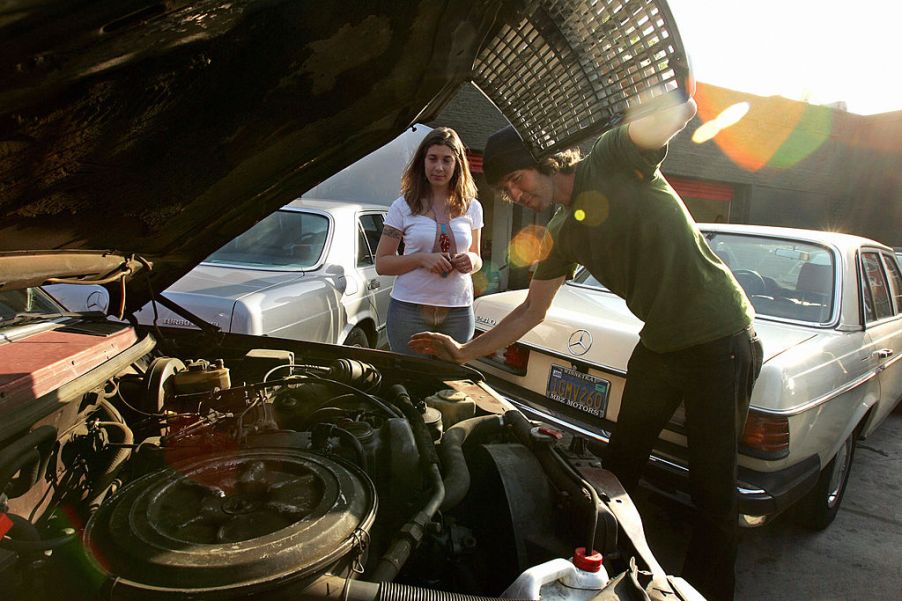
Why HOAs Don’t Let Homeowners Do Oil Changes in the Neighborhood
Owning a property in a community run by a homeowners’ association has its benefits. HOAs maintain amenities such as swimming pools and golf courses. They often take care of services like snow removal and trash collection.
HOAs also provide clear guidelines as to what is allowed and not allowed in the community. And therein lies the rub: many HOAs ban its members from changing the oil or doing other basic car maintenance, either in their neighborhood or their driveway. While this rule seems like it’s too restrictive, we’ll check out the very convincing reasons why HOAs enforce it.
An HOA rule that DIY car fans don’t like
Homeowners’ associations have been under fire for draconian or just plain silly rules for a number of years now. Some, to the chagrin of car fans, focus on property owners’ vehicles.
For example, an HOA in New York State sued a couple for parking their new Ford F-150 in their driveway. According to the HOA’s covenants, the driveway was considered common property where only private passenger vehicles could park. Apparently, the F-150 pickup wasn’t a passenger vehicle in the eyes of the HOA committee.
Luckily for the couple, a settlement in their favor was reached with the HOA in their state’s supreme court. But it’s easy to see how rules intended to protect property values and comply with local or state laws can go haywire depending on how they are interpreted.
An HOA rule that forbids oil changes or other simple vehicle maintenance in a property owner’s driveway is clear and not open to interpretation. But this commonplace rule chafes people who like to work on their cars and maybe want to save a little money, too. If they feel as if HOAs don’t like people who like cars, as Redditors have discussed in a recent thread, it’s understandable.
Yet this rule really isn’t about discouraging car lovers from buying a property in a development with an HOA. There’s much more to it.
The rationale behind the oil change rule
It’s true that many HOA committees don’t think that a car up on ramps mid-oil change in a driveway is a good look for the neighborhood. Property values are driven to some extent by how the whole street looks, not just one house.
Oil stains on common areas, which can include driveways, are another concern for HOAs. Not everyone is conscientious enough to use an oil catch pan or mat, nor do they want to take time to scrub their driveways with Dawn dish soap after an oil change. HOAs know that and want to nip the problem in the bud.
Sloped driveways are also problematic. If the oil misses the catch pan and starts flowing downhill, the stain will spread. This makes an even bigger mess than a spill that occurs on the flat. And sometimes used motor oil that flows downhill goes into a storm drain, which makes for a different, more far-reaching set of problems.
Even more serious consequences
Beyond an HOA’s worries about aesthetics, though, are environmental concerns. Spills — even small ones — from oil changes can also drain into a municipal water supply. The Environmental Protection Agency states that a spill from one oil change can contaminate as much as a million gallons of water or a year’s supply of water for 50 people.
In addition, municipal, county, and state environmental laws often take precedence over an HOA’s covenants. So, a homeowner, an HOA, or both can be on the hook for a fine from government agencies in the case of an oil spill.
Some HOAs will even go as far as to forbid oil changes in homeowners’ garages. The reasoning behind this version of the rule is because of possible fumes or the chance of fire.
So, if you enjoy changing your own oil on your car, truck, or bike, is buying or renting a home in a community that has an HOA a total no-go? Not necessarily. But before committing, you’ll want to read the HOA rules thoroughly so that you know what you’ll be getting into.
If the HOA outlaws oil changes or basic car repairs at a community you’re considering, it’s unlikely you’d be able to get a variance as you might be able to with, say, architectural changes to your home. You could get on the HOA committee but if local government laws support the no oil change rule, it might be hard to change it.
It’s at this point that you’ll have to decide whether you’re okay with not doing your own oil changes or maybe doing them somewhere other than in your neighborhood, as forum participants suggest at BobIsTheOilGuy.com. Or, you might want to shop around for another community, instead.


